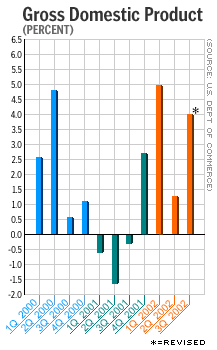NEW YORK (CNN/Money) -
U.S. GDP growth could be much worse than expected in the fourth quarter of 2002, thanks to an economic number that came out Friday but drew little attention: the trade gap.
The Commerce Department said the gap between U.S. exports and imports swelled 13.9 percent to a record $40.1 billion in November, much bigger than the $36.4 billion gap economists, on average, were expecting, according to Briefing.com.
Though the news was surprising, it drew little reaction from U.S. stock markets or economists, who pointed out that the end of a 10-day dockworkers' strike on the West Coast led to a sudden flood of imports and skewed the data.

And these data describe November, which, for obvious reasons, is of precious little interest for people trying to predict the economy's future.
But the report will make a big splash in the Commerce Department's report on fourth-quarter gross domestic product (GDP). The report, due Jan. 30, is the broadest measure of U.S. economic growth.
Briefing.com doesn't have a consensus estimate yet for GDP growth in the fourth quarter, but most economists already expected it to be much lower than third quarter's GDP growth of 4.0 percent. Few expected GDP to grow much more than 2 percent in the quarter.
And many economists were trimming their estimates even more after the trade-gap report Friday. Imports and exports feed directly into the GDP report, with imports subtracting from GDP and exports adding to it. The more imports outpace exports, the worse the news is for GDP.
"It's going to be very close to zero," said Sung Won Sohn, chief economist at Wells Fargo & Co., who expected GDP growth of just 0.5 percent before the trade gap report.
In fact, the trade report led many economists to shave about 0.5 percentage points from their GDP estimates. For those whose estimates were close to zero anyway, the trade gap could push their estimates into negative territory -- at least one firm, JP Morgan, actually did cut its estimate into the red -- meaning the economy might have shrunk in the quarter for the first time since the 2001 recession.
"Consumer spending was weak in the quarter, trade's not going to be a help, and business investment's not going to help," said Joshua Feinman, chief economist at Deutsche Bank Asset Management. "Add them up, and there's not a whole lot of 'there' there."
In reality, the fourth-quarter GDP report won't really say much about what the economy will do in the future.
But an ugly, negative number on GDP might not do much good for investor and consumer confidence, if it's taken as a sign that the economy made a "double dip" back into recession after all.
"A negative reading would be a noticeable headline," said Lehman Brothers chief economist Ethan Harris. "Some people will quickly discount it, say it's old news, but it could reawaken concern about the economy."

|

